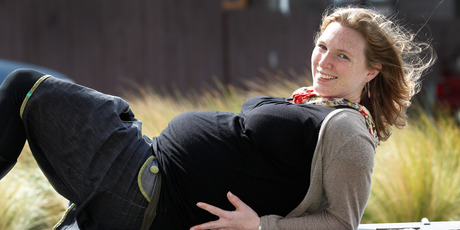
Not only are they carrying more kilos, heavily pregnant women also sleep
less and snore more.
New research has confirmed what many couples sensed - women in the later
stages of pregnancy lose one hour of sleep a night, have poorer-quality sleep
and snore more than before they were pregnant. The study, led by Massey
University's Sleep/Wake Research Centre, showed 1091 Kiwi women, aged between
16 and 46 and 35 to 37 weeks pregnant, found their quality of sleep got worse
and more uncomfortable as their pregnancies progressed. Frequent visits to the
toilet, followed by discomfort and pain and the baby kicking and moving were
also the main reasons for broken sleep three or more nights a week.
Almost a quarter of the women surveyed also admitted they started
snoring loudly more than three times a week in the late stages of pregnancy. Co-principal
investigator of the E Moe Mama study, Dr Sara-Jane Paine, said the findings
around increased snoring were most surprising and worrying because other
research had found newly developed snoring could indicate health problems.
Rosie Gibson's sleep hasn't been the same since she became pregnant. At
the beginning of her pregnancy, she was woken up by hunger pains so she would
have to pour herself large cups of Milo to settle them. Now at 35 weeks her
sleep is broken from the baby moving and leg cramps. The 29-year-old Wellington
PhD student thought she had managed to escape snoring until last week, when her
boyfriend, Gavin Mouldey, started asking her to turn over because she was
breathing heavily in her sleep. "My sleep is now disturbing my partner and
we are just starting to talk about would it make sense if we actually slept in
separate rooms because between us we are waking each other up," the
first-time mum-to-be said.
She is also surrounding herself with various shaped cushions to help her
to sleep.
Sleep Store founder Louise Tanguay said most pregnant women experienced
sleepless nights. The mother of four said the best tips for improving sleep
were getting a good, long maternity pillow to keep the pelvis at the right
angle and not drinking too much in the evening. The research will be used to
develop guidelines, material and support information for medical practitioners
to help sleep-deprived mums-to-be. A lack of sleep in pregnancy has been found
to affect women's health, such as causing longer labours, making more medical
intervention necessary during a birth, such as a caesarean section, or causing
mood changes once the baby arrives.
NZ Herald
Please share
What are the best websites and blogs dedicated to similar material?
ReplyDeleteTrying to learn more on the subject in our name. By the way, great article
about "Noisy truth about pregnant women".
Check out my web page :: Best Treatment For Insomnia
Thanks for your comments. When I learn of such blogs I will inform you.
DeleteMarvelous, what a webpage it is! This web site
ReplyDeletepresents helpful facts to us, keep it up.
Visit my blog ; diets that work for women